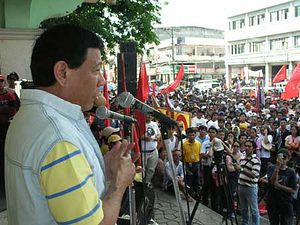Philippine President Rodrigo Duterte has said that his country will accept firearms being pushed by China weeks after controversy erupted over a rifle agreement with the United States.
Since coming to office in June, Duterte has been pursuing what his aides term a more independent foreign policy, which, thus far, has meant more distance from the United States, the Philippines’ traditional ally, and warmer ties with China and Russia (See: “The Limits of Duterte’s China-US Rebalance“). Though he is just the latest in a succession of Philippine presidents trying to balance ties between major powers, the initial ferocity of his anti-American rhetoric and the speed at which he has tried to advance ties with Beijing have been striking (See: “Why the Philippines’ Rodrigo Duterte Hates America“).
On Sunday, during a visit to the Armed Forces of the Philippines’ Northern Luzon Command at Camp Aquino in Tarlac City, Duterte signaled that the Philippines would be finalizing a firearms deal with China that would boost bilateral security ties.
“China is pressing me that the firearms are ready. I will accept them. They rushed these for us,” Duterte said.
Further underscoring the pressure from the Chinese side, Duterte said the rifles were ready and that Beijing wanted them shipped immediately, making it “obvious that China wants to give this to us.”
The terms that China had offered, Duterte said, was a grant payable in 25 years, which he characterized as “really practically giving.” He also did not fail to emphasize the fact that with China willing to give the arms to the Philippines on such favorable terms, there was no need for Manila to look elsewhere.
“So it’s really very easy for us,” he said. “We do not need to ask for these from other [countries] because they [China] are willing to give it,” he said.
Though he did not identify these “other countries,” controversy had erupted last month over the Philippines’ purchase of 26,000 assault rifles from the United States. Duterte initially said in early November that he had ordered the Philippine National Police (PNP) to cancel the order and that Manila could get the arms from somewhere else if the United States applied pressure on human rights in the wake of his controversial war on drugs. But shortly after the U.S. presidential election, PNP chief Dela Rosa told a news conference that Duterte had told him to continue the deal, apparently because there would be a new president in Washington.
In terms of next steps, Duterte said that he would send Defense Secretary Delfin Lorenzana to finalize the deal with China, though he was vague about exactly how things would proceed in relation to the Philippine Department of National Defense (DND). Lorenzana became the first Philippine defense chief to visit Russia since diplomatic ties were established in 1976 and had said that Manila would conduct a study to see whether a separate agreement for sniper rifles could be forged with Moscow.
On Monday, local media outlets reported that Raymundo Elefante, the DND undersecretary for finance, munitions, installations, and material, had confirmed that Beijing made the offer but said the types of the firearms are still to be determined.
China’s Ambassador to the Philippines Zhao Jianhua also told reporters late Monday that though both sides were “exploring the possibilities” for providing what he termed “light arms” for counterterrorism and counternarcotics, talks were still at the initial stage and there was no agreement on price or the specific type of weapons.

































